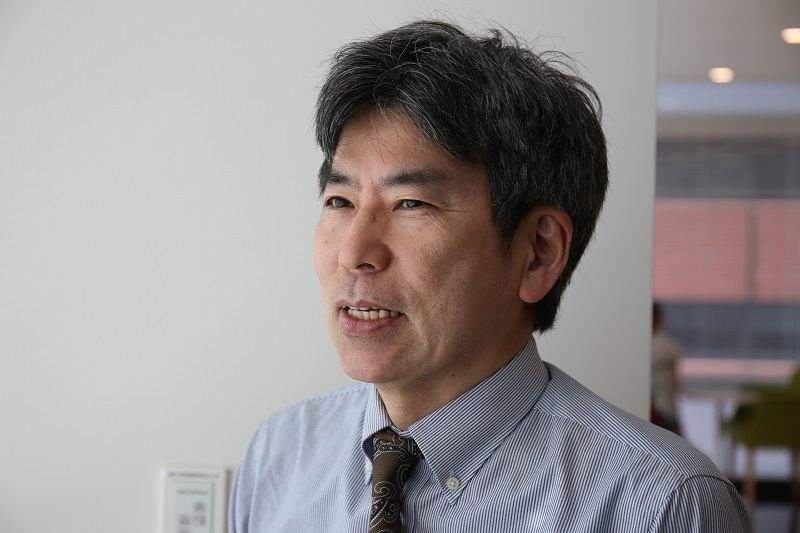
Giant mosaic artwork planned by young people in Suzu City and completed by the children of Iida Elementary School, seen on April 15, expresses the desire not to give up because of the earthquake.
8:00 JST, May 11, 2024
When education is subjected to extreme situations, its true essence is revealed. The actions of teachers in disaster-stricken schools following the Jan. 1 Noto Peninsula Earthquake shed light on the role of teachers. Despite losing their own homes in the earthquake, teachers tirelessly worked for the sake of the children. In addition to teaching, teachers helped children overcome difficult situations by creating a school environment where they could feel safe and find happiness.
This shows a holistic approach to education in which teachers not only help children learn knowledge and skills, but also cultivate the sensitivity and ethics that children possess, with the goal of developing the whole person. Many teachers in Japan have more or less adopted this approach, and the teachers I interviewed in the affected areas were among them.
One such teacher is Principal Motoko Aizumi of Iida Elementary School in Suzu City, Ishikawa Prefecture. Located on the tip of the Noto Peninsula, the area was hit by strong tremors measuring up to 6 on the Japanese intensity scale, causing the collapse of many houses, including her home.
The principal continued to manage the school while sleeping in her office. A shelter was set up at her school, where many residents took refuge. Realizing that the presence of the shelter could serve as a valuable learning opportunity, she encouraged the children to explore it. She wanted them to study how the shelter was operated, understand the feelings of volunteers and local residents involved in its management, and learn things they could only experience at that moment.
The fifth and sixth graders went first. Together with their teachers, they toured the shelter, making observations and comments like, “This must be the command center,” “I wonder what’s written on the blackboard,” and “They’re managing relief supplies here too.”
They were particularly surprised to see that most of the people in the shelter during the daytime were elderly. While their parents were involved in clearing the debris of collapsed buildings, the children wanted to do something for the elderly, so they organized activities such as massages, entertaining school broadcasts, and radio calisthenics to alleviate the evacuees’ boredom.
Inspired by the fifth and sixth graders’ actions, the third graders expressed their desire to contribute. After discussing it among themselves, they presented the results of their exploration activities from before the earthquake to the elderly people taking shelter and also enjoyed spinning tops together. The third graders’ homeroom teacher, who had just graduated from university, also had her home destroyed and could no longer live there. Commuting from a shelter set up at another elementary school, she bustled around to realize the children’s requests.
Many people, including medical professionals and local government officials, worked tirelessly without sparing a thought for themselves during the disaster, but I think the dedication of teachers was equally outstanding. The children’s uninterrupted learning is one of the results. Teachers keep a close eye on every aspect of the children’s lives. They have supported schools in fulfilling their role as centers of the local community.
According to the Organization for Economic Cooperation and Development, such holistic education traditions have contributed to the resilience demonstrated by Japanese education in crisis situations.
Andreas Schleicher, director for education and skills at the OECD, visited Japan in March, two months after the earthquake. He visited the Noto Peninsula, inspected the disaster-affected schools, and listened to accounts of the situation from many principals and teachers. In an email he sent me after leaving Japan, Schleicher wrote: “Many wondered how Japan could maintain its strong educational performance in Program for International Student Assessment (PISA) during the years of the pandemic, when much of the world saw a sharp decline in student learning outcomes. The visit to the Noto Peninsula helped me understand this better. Japan is a country of natural disasters, but it is also a country of extraordinary resilience.”
However, Schleicher is concerned that such holistic education in Japan is losing some of its magic and charm. He cites the commercialization of education as one of the reasons. In the education market, children are seen as consumers of learning content, and teachers are viewed as service providers. This is a global trend, and Japan is no exception. “This trend is beginning to take hold in Japan, and it tears apart a tradition where school was the center of the community,” he says.
I believe that the media bears some responsibility for the wavering of holistic education. For example, there have been news reports of scandals involving teachers who commit indecent acts, and other reports emphasizing negative aspects such as overwork and unfair treatment. While such issues need to be addressed and cannot be ignored, the ratio of positive news inevitably decreases. To prevent the media from one-sidedly spreading negative images of teachers, The Yomiuri Shimbun conducted a campaign last year to consciously introduce positive topics for a year.
Aizumi says, “As a result of learning from the shelter and the people, the children’s sense of solidarity has visibly strengthened and each child’s motivation to learn has increased.” Although she privately wished for her students to remain in Suzu as a driving force for the city’s reconstruction, she refrained from including words to that effect at the graduation ceremony, not wanting to limit her students’ future.
Four months after the Noto Earthquake, the tension that prevailed in the disaster’s immediate aftermath has eased. It is a time when fatigue is keenly felt. Therefore, she has decided to operate the school at a slower pace than usual, such as by postponing school events.
For “integrated studies,” which aims to help students develop the competencies defined by the school’s goals by working on projects related to real-life issues, the theme naturally chosen for this year was “disaster prevention.” Aizumi believes that rich exploratory learning enables children develop the skills they need in today’s world.
Although the number of young and inexperienced teachers is increasing, there are still many good, experienced teachers, like her. With good teachers, children may also have a happy school life. A good relationship between children and teachers is the most important factor in determining children’s well-being in school.
The holistic approach of education in Japan is highly evaluated internationally. The problem is that it is not well accepted in Japan anymore. Perhaps we should raise the social and economic status of educators and make teaching an even more respected profession than it is today.
The Central Council for Education, an advisory body to the education, culture, sports, science and technology minister, has made a rough draft of the proposal that the Teachers’ Salary Special Measures Law enacted in 1971 be amended to raise the “teaching adjustment amount,” which is paid uniformly as overtime pay. I am very much in favor of the proposal, and I hope it will result in a very generous salary increase.
If we are willing to make a substantial investment in our own children’s education, surely we can find the money to do so. The quality of education never exceeds the quality of teachers. The more money we spend on teachers, the better our education, and our future, will be.
Political Pulse appears every Saturday.

Makoto Hattori
Hattori is a staff writer in the Education News Department of The Yomiuri Shimbun
Top Articles in Editorial & Columns
-

Riku-Ryu Pair Wins Gold Medal: Their Strong Bond Leads to Major Comeback Victory
-

China Provoked Takaichi into Risky Move of Dissolving House of Representatives, But It’s a Gamble She Just Might Win
-

University of Tokyo Professor Arrested: Serious Lack of Ethical Sense, Failure of Institutional Governance
-

Policy Measures on Foreign Nationals: How Should Stricter Regulations and Coexistence Be Balanced?
-

Japan’s Plan for Investment in U.S.: Aim for Mutual Development by Ensuring Profitability
JN ACCESS RANKING
-

Japan PM Takaichi’s Cabinet Resigns en Masse
-

Japan Institute to Use Domestic Commercial Optical Lattice Clock to Set Japan Standard Time
-

Israeli Ambassador to Japan Speaks about Japan’s Role in the Reconstruction of Gaza
-

Man Infected with Measles Reportedly Dined at Restaurant in Tokyo Station
-

Videos Plagiarized, Reposted with False Subtitles Claiming ‘Ryukyu Belongs to China’; Anti-China False Information Also Posted in Japan























